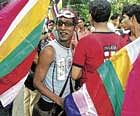
Despite the Delhi High Court upholding gay rights, the transgenders and gays in the City lead the same life and are subject to the same discrimination. Nothing has changed. They continue to remain the third gender that is looked down upon and ridiculed.
Bangalore is home to more than 5,000 sexual minorities (hijras, kothis, female to male, gays and lesbians). And each group has its own horror story to narrate. They are ill-treated, humiliated and stamped upon at every step. They have no proper place to stay, healthcare is at its lowest, no jobs and they are forced to do petty and menial work to eke out a living.
Metrolife interacted with a few transgenders and organisations that work among them to gauge the ground reality. We found out that they were plagued by umpteen problems — from transport to health care. They’re asked to prove their gender wherever they go whether it’s for a treatment in a hospital, using a public toilet or even renting a place to stay. Doctors refuse to touch them and commuters, on a bus,
refuse to let them get anywhere close to them. “Where should I stand when I enter a bus?” asks Akkai Padmashali, a kothi and adds, “Women push me saying “you are a man” and male passengers tease me by calling names when I go back. Why are we shuffled around?” she questions.
It's not just in public transport that these people face trouble, using public toilet is a story in itself. They’re asked to prove their identity before using the toilet. “How humiliating is that? I am not a male. I am a female, but because I was biologically born as male, I am forced to use the gent's toilet after lots of cross questioning and at times physical examination as well," says Shashi Kumar P, a kothi.
Females who have converted themselves to males say it's a challenge to attend nature’s call in public, during an emergency. “The guard by the toilet will not allow us to use
female’s toilet saying you are male in appearance and how can we then use male’s toilet?" asks Sonu, a female to male. “We don’t need exclusive toilets but must be
allowed to attend nature’s call according to our gender,” avers Sunil, another female to male. “We want to be accepted as part of the mainstream society. Providing a separate cell in jail and giving sites on the outskirts of the City will not solve our problems,” he adds.
Health care facilities have been virtually deprived for these inter-genders. “Doctors always force us to reveal our gender,” says Akkai, who works in the information
department of Sangama, a human rights organisation in the City. These transgenders are not treated by the doctors until and unless they zero in on a particular sex group. “A few years ago, I met with an accident and was taken to a hospital where the doctor, doubted my gender and refused treatment. I was told to shorten my hair and cut my nails or else I would not be treated. I lay there for a week without being attended to,” explains Shashi.
Opportunities don’t come knocking the transgender way. “I was good at my academics but I had to drop out half way due to nagging and teasing from fellow students and peers,” says Shashi. “I would have worked in a call centre or an IT firm had I an opportunity. I would never have entered sex work,” says a kothi. “Look at our work and not at our sexuality,” urges Sunil. These transgenders think lesbians are in a better position, “Umpteen questions crop up when two girls stay in a room, but it gets worse when one female turns to male,” says Durga. “Renting a place too is a huge challenge. Owners don’t rent out their homes and if we keep shifting our residence, getting a ration card is a problem. We are left in the lurch most of the time,” she concludes.